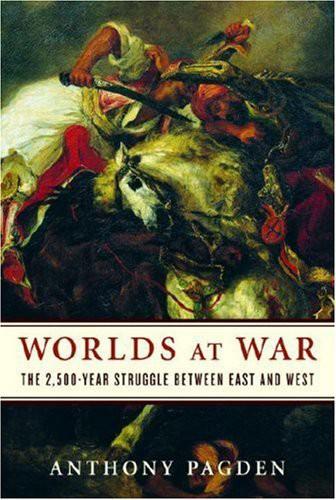
Worlds at War
The 2,500-Year Struggle Between East and West
کتاب های مرتبط
- اطلاعات
- نقد و بررسی
- دیدگاه کاربران
نقد و بررسی

November 12, 2007
In the pessimistic words of the ancient historian Herodotus, there will ever be “perpetual enmity” between the globe’s two halves. Pagden (Peoples and Empires
), a professor of political science and history at UCLA, tackles the immense sweep of 2,500 years of bad blood and seeks to explain the feud’s continuing existence despite the increasing erosion of national differences. Does the trouble have geographical roots, or might it stem from religious differences? Pagden is convinced that in fact East and West are separated more by values and culture than by anything else—democratic vs. authoritarian rule, secular vs. theocratic and, later, Christian vs. Muslim. Though some readers might cavil at Pagden’s reductionist assertion that religion has “caused more lasting harm to the human race than any other single set of beliefs,” his book is an accessible and lucid exploration of the history of the East-West split, concluding with a nuanced look at the divisions and misapprehensions that continue to the present time. Fans of Jacques Barzun and Jared Diamond will be most impressed by Pagden’s “big picture” perspective.

February 15, 2008
Plumbing millennia of conflict between European civilizations and those of the Near East, historian Pagdenoutlines historical antecedents to present frictions between the secular West and the Muslim world. If the collisions between Greek and Persian, Roman and barbarian, Christian and pagan, Christian and Muslim, and imperialist and nationalist have something in common, according toPagden, it is the rivalry of universalistic ideas about humanity and providence.Through each of these pairs of opposites, Pagden introduces intellectuals of the age who puzzled over their cultural adversary, often in response to a calamity, such as the Crusaders capture of Jerusalem in 1099 or the Ottoman conquest of Constantinople in 1453. Their analyses, whose realism or logic Pagden critiques, for returning humanity to its providential destination, be it Christianity, Islam, or liberal democracy, slot into the authors chronological narrative of major exacerbations of West-East animosity, from the Trojan War to the Iraq War. Inquisitive and incisive about the sweep of history, Pagden will connect with readers wanting to deepen their grasp of contemporary news.(Reprinted with permission of Booklist, copyright 2008, American Library Association.)

























دیدگاه کاربران